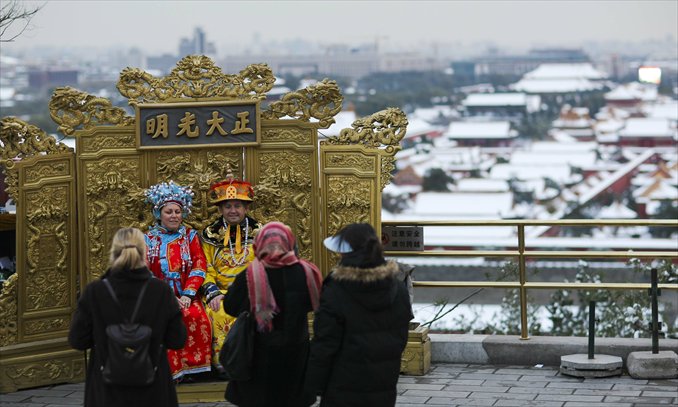Evolving attitudes to foreigners

Foreigners take pictures sitting on a replica "dragon seat" in Jingshan Park. Photo: CFP
Four years ago, Beijing sang "Beijing Welcomes You" for the 100-day countdown to the 2008 Olympic Games, but now the city has added an "if" during the 100-day crackdown on illegal foreigners. Beijing welcomes you if you are not an illegal immigrant, have not overstayed your visa or are working with the right visa.
Having been living in Beijing for eight years, Philip from the US thinks the city is sending out a confusing message: Beijing welcomes you, question mark.
"I always felt at home in Beijing, but now I am not so sure," said the marketing professional. He recalled that some of his friends were kicked out during a similar crackdown before the Games in 2008.
Mooted database of illegal aliens
Since Beijing kicked off the campaign to "clean out" non-Chinese living or working illegally in the city in the middle of May, many foreigners have found themselves greeting police at their doors, at bars or on the street. Some were taken by police to their homes on the spot to check their necessary documents. Others were stuck in Mongolia after failing to renew their visas.
It is the first time that Beijing has openly targeted illegal aliens. The crackdown soon spread to other cities in China.
Apparently, China is quickly becoming a new destination for illegal immigrants. Most of them have been attracted by a booming economy and a relatively relaxed visa policy until now. The number of foreigners visiting China has increased from 740,000 in 1980 to 27 million in 2011.
Experts believe that learning how to handle the increasing flow of immigration is just a baby step for a growing international city.
"When you open your door to the world, you don't know what you are going to get," Liu Guofu, a professor and immigration law expert with the Beijing Institute of Technology, told the Global Times. "But instead of closing the door and keeping all the foreigners out, China should learn how to deal with them effectively to attract and retain foreign talents."
He said it is difficult for China to deal with this situation due to its lack of experience in the field.
"A database of illegal immigrants should be set up during this nationwide crackdown, it would be an invaluable resource in the future," he advised.
Crackdown with Chinese characteristics
Although the police flatly deny this, it has been widely speculated that the campaign is linked to a video that showed a British tourist appearing to sexually assault a Chinese woman on the street on May 8. The video outraged many Internet users and led to a fierce debate about foreigners' behavior in China.
The campaign, to last until the end of August, includes household checks in areas of the city known for their high concentration of foreigners, as well as on-the-spot street checks that require foreigners to show valid identification. Anyone found in violation of the rules may face penalties ranging from fines or detention to deportation, according to the Beijing Municipal Public Security Bureau.
"There are no special groups above the law. We will protect the legal rights of all people, including foreigners who work and live in Beijing, while punishing those who violate the law," the Xinhua News Agency quoted the spokesman of the bureau as saying.
Many reached by the Global Times understand that China must protect its citizens, just as foreigners have the responsibility to abide by the laws of the country they are in. Even so, those here legally feel insecure and badgered by the police.
Michael Meyer from Denmark who teaches English in a primary school said he is annoyed at having to carry his passport on him at all times. "I understand the policy. I think I would be more nervous after the crackdown on foreigners. Even I am here legally, I still feel unsafe."
Nick from Italy who didn't disclose his full name just arrived in Beijing two weeks ago. He said some of his friends stay close to home to avoid running into trouble.
Liu said it is because traditionally China has been offering foreigners better treatment than to its own citizens. "It means some people find it hard to adjust that China begins treating them 'normally.'"
He added that the crackdown is not as strict as in some other countries. "The way that police perform might be rude. It is because they are not really good at English and inexperienced in dealing with foreigners."
"But if you are living and working legally, what are you afraid of?" he asked.

No artful dodges
Some foreigners think they are easily able to dodge the authorities. However, with so many "eyes" in the city, it is getting increasingly difficult to do so.
One American who overstayed his visa recently blogged about his experience as an inmate in a Chinese jail. He said like many foreigners in China, he arrived in Shanghai in search of the "jade dream." But he found out that finding work that did not involve teaching English was not as easy as he had hoped.
"Eventually my three-month tourist visa expired. I thought I would be OK as long as I laid low — but I was wrong. There are eyes everywhere in China, especially on foreigners," he wrote under the name Lionel Carver.
To avoid the police, he fled to a cheap apartment in northern Shanghai, where he lived quite frugally — no TV, Internet or bed. The police eventually found him and put him in detention for eight days.
"My mom had been so proud of me for venturing off to China to find my fortune in spite of my physical limitations, but I failed to find steady employment abroad and had gotten myself arrested and deported instead," he wrote after having beaten cancer at an early age.
The positive thing is that the immigration official informed him that because of his good attitude, he could return to China at once if he so wished instead of blacklisting him for five years, as was the usual policy.
Since 2000, Beijing has deported about 45,000 illegal foreigners, costing the police about 2 million yuan ($314,200) a year for the tickets and other subsidies, according to the police.
The only ones who are happy about the crackdown are the visa agencies. It is reported that there are about 10 agencies in Beijing alone who say they can take care of visas for foreigners. Their services range from 5,000 to 30,000 yuan.
An agency employee told the Global Times that their business has doubled since the crackdown.
"If money can solve a problem, then it is not really a problem. We often suggest our clients get a student visa, even if some of them are in their 40s. With a student visa you can travel, you can work, and no one really knows you are not a student."
Three people in Shenzhen, Guangdong Province, were charged for making fake visas for overstayers with their own computer at home in 2007. Each one was fined about 6,000 yuan.
After 100 days
Many foreigners have their fingers crossed that everything will get back to normal 100 days later. But they believe what they call an anti-foreigner sentiment will linger on.
CCTV host Yang Rui posted on Sina Weibo that Beijing must "clean out its foreign trash" to "protect innocent girls." A blogger set up a website called fanduinanlaowai, literally translated as anti-male foreigner, to collect evidence of bad behaviors by male foreigners.
Konstantin from Russia had a recent unpleasant encounter with his Chinese colleague during the crackdown. He said when they were arguing about work, the Chinese colleague told him to go home in front of their Chinese team at their media company.
Feeling insulted and humiliated, Konstantin wrote an official letter to his boss and wanted to quit. As a result, the boss said if such actions happened again, those responsible would be fired.
Experts believe the end of the crackdown will be the beginning of closing administrative loopholes concerning foreigners.
"The public should not overreact to foreigners' bad behavior in China," Shen Fei, a researcher of policy concerning foreign affairs, told the Global Times.
"Illegal immigrants cannot be wiped out by one campaign, it is a turning point for Beijing to effectively manage foreigners," he added.
Instead of relying on tips for exposing illegal foreigners, China's National People's Congress is considering updating the country's current laws to regulate the entrance, residence and working status of foreigners in accordance with new conditions.
If the new law is approved, police will have more power to directly handle illegal entries and related cases, and a special custody house will be set up for foreigners who break the law.